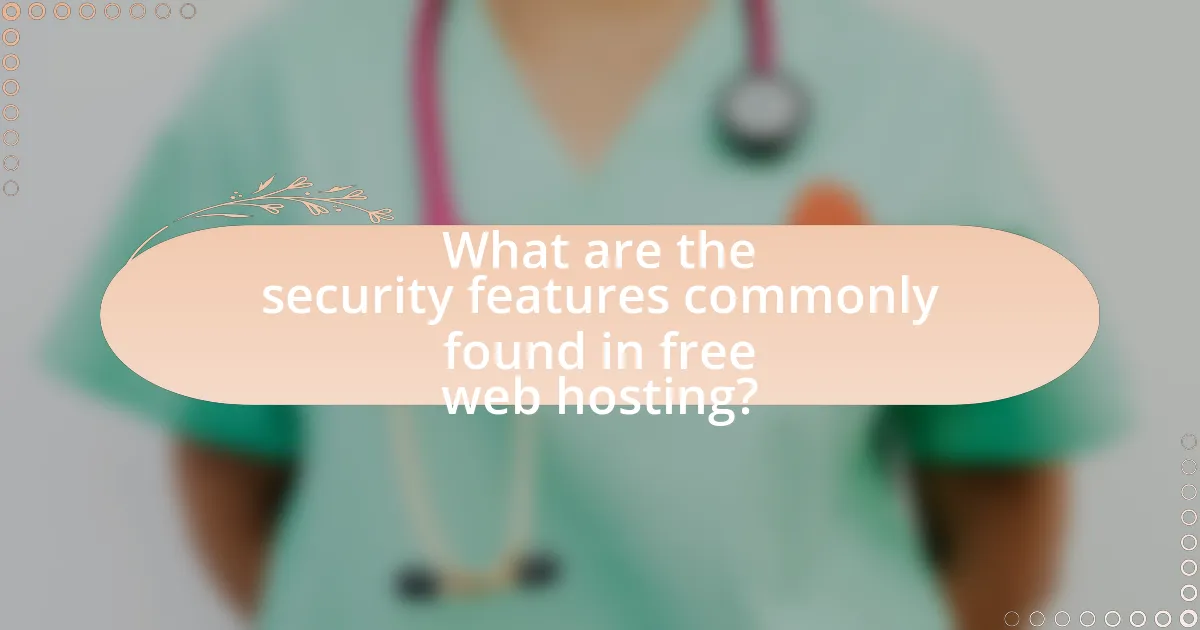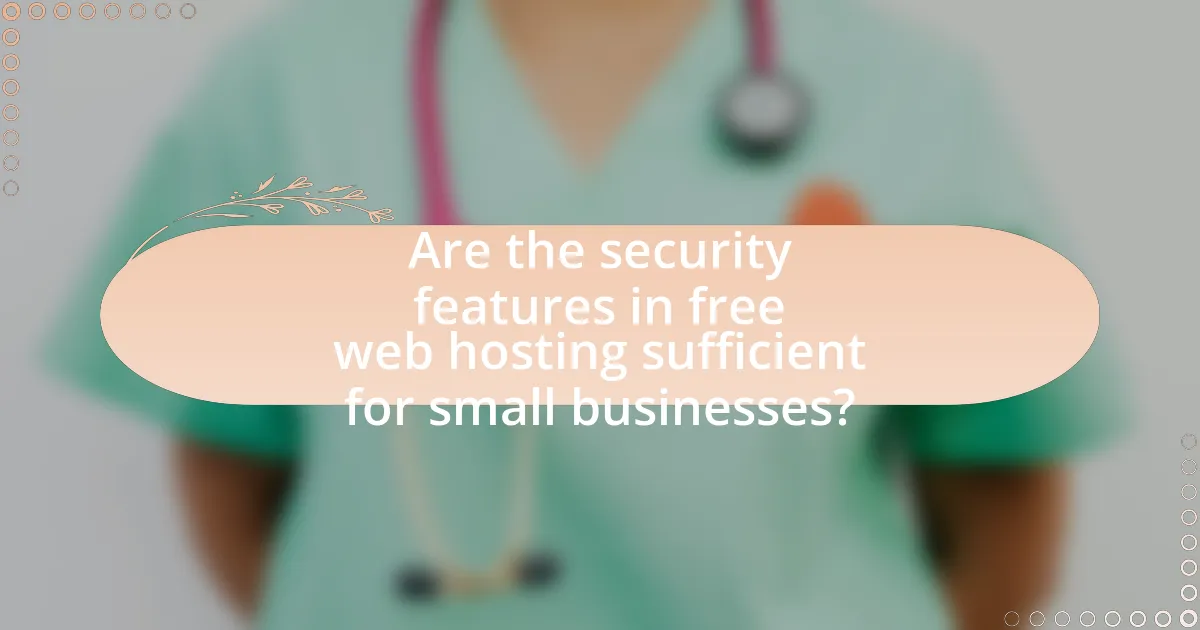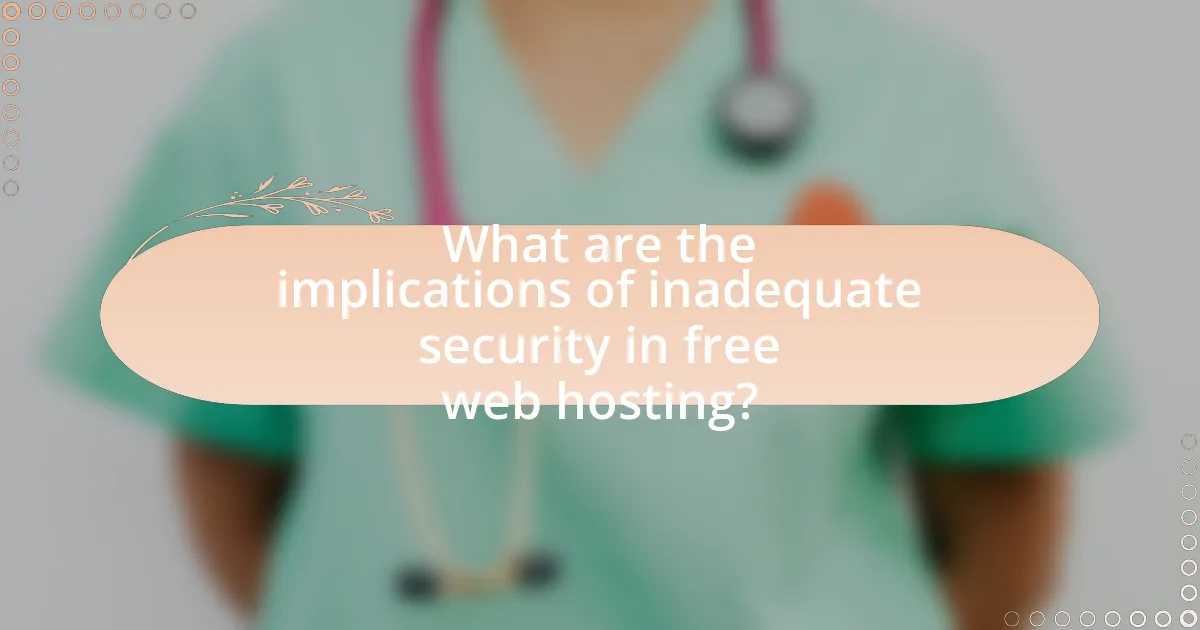The article examines the security features commonly found in free web hosting services and evaluates their sufficiency for users, particularly small businesses. It highlights the limited security measures offered by free hosting providers, such as basic SSL certificates and firewalls, and contrasts these with the more robust security options available in paid hosting services. The discussion includes the types of threats faced by free web hosting, the implications of inadequate security, and the importance of user responsibility in maintaining website security. Additionally, it outlines best practices for enhancing security on free hosting platforms and suggests alternatives for businesses seeking more secure hosting solutions.

What are the security features commonly found in free web hosting?
Free web hosting services typically offer limited security features, including basic SSL certificates, firewalls, and malware scanning. These features aim to provide a minimal level of protection against common threats. However, the effectiveness of these security measures can vary significantly among providers. For instance, while some free hosts may include automated backups and DDoS protection, others may lack essential security protocols entirely, leaving users vulnerable to attacks. The reliance on shared resources in free hosting environments further increases security risks, as vulnerabilities in one site can potentially affect others on the same server.
How do these security features compare to paid web hosting options?
Free web hosting options typically offer limited security features compared to paid web hosting services. Paid hosting often includes advanced security measures such as SSL certificates, regular malware scans, and DDoS protection, which are frequently absent in free plans. For instance, a study by HostingAdvice found that 70% of paid hosting providers offer automatic backups, while only 10% of free hosting services do. This disparity highlights that paid options generally provide a more robust security framework, essential for protecting sensitive data and maintaining website integrity.
What specific security measures are typically lacking in free web hosting?
Free web hosting typically lacks essential security measures such as SSL certificates, regular security updates, and robust firewalls. SSL certificates are crucial for encrypting data transmitted between users and the website, yet many free hosts do not provide them, exposing users to data interception risks. Regular security updates are often neglected, leaving websites vulnerable to known exploits and malware. Additionally, free web hosting services frequently lack advanced firewalls and intrusion detection systems, which are vital for protecting against unauthorized access and cyberattacks. These deficiencies can lead to increased risks of data breaches and compromised user information.
How do user reviews reflect the effectiveness of these security features?
User reviews reflect the effectiveness of security features by providing firsthand accounts of user experiences and outcomes related to those features. When users report successful prevention of security breaches or data loss due to specific features, it indicates that those features are functioning effectively. For instance, a review highlighting that a web hosting service successfully thwarted a phishing attack due to its robust firewall demonstrates the feature’s reliability. Conversely, negative reviews citing instances of security failures, such as unauthorized access or data breaches, suggest that the security measures may be inadequate. This feedback loop from users serves as a practical assessment of the security features’ performance in real-world scenarios.
What types of threats do free web hosting services face?
Free web hosting services face several types of threats, including security vulnerabilities, data breaches, and resource abuse. Security vulnerabilities arise from inadequate security measures, making these services susceptible to attacks such as SQL injection and cross-site scripting. Data breaches can occur due to weak access controls, exposing sensitive user information. Resource abuse happens when malicious users exploit free hosting resources for activities like spamming or distributing malware, which can degrade service quality for legitimate users. According to a report by the Cybersecurity & Infrastructure Security Agency, free hosting platforms are often targeted due to their lack of robust security protocols, making them attractive to cybercriminals.
How do these threats impact the security of hosted websites?
Threats such as malware, DDoS attacks, and data breaches significantly compromise the security of hosted websites. Malware can infiltrate a website, leading to unauthorized access and data theft, while DDoS attacks overwhelm servers, causing downtime and loss of service. Data breaches expose sensitive user information, damaging trust and potentially resulting in legal repercussions. According to a report by Cybersecurity Ventures, cybercrime is projected to cost the world $10.5 trillion annually by 2025, highlighting the severe financial impact of these threats on website security.
What are the most common vulnerabilities associated with free web hosting?
The most common vulnerabilities associated with free web hosting include lack of security updates, weak password policies, and inadequate data encryption. Free web hosting services often do not prioritize regular security updates, leaving websites exposed to known vulnerabilities. Additionally, many users do not implement strong password policies, making accounts susceptible to brute-force attacks. Furthermore, data encryption is frequently insufficient, which can lead to data breaches and unauthorized access to sensitive information. These vulnerabilities are documented in various cybersecurity reports, highlighting the risks associated with using free hosting services.

Are the security features in free web hosting sufficient for small businesses?
The security features in free web hosting are generally insufficient for small businesses. Free web hosting services often lack essential security measures such as SSL certificates, regular backups, and robust firewalls, which are critical for protecting sensitive business data. According to a 2021 study by the Cybersecurity & Infrastructure Security Agency, small businesses are particularly vulnerable to cyberattacks, with 43% experiencing attacks that exploit weak security protocols. Therefore, relying on free web hosting can expose small businesses to significant risks, making it advisable for them to invest in paid hosting solutions that offer comprehensive security features.
What are the risks of using free web hosting for business websites?
Using free web hosting for business websites poses significant risks, including limited security features, lack of customer support, and potential data loss. Free web hosting services often do not provide adequate security measures such as SSL certificates, firewalls, or regular backups, which can leave websites vulnerable to cyberattacks and data breaches. Additionally, the absence of reliable customer support can hinder timely resolution of issues, leading to prolonged downtime and loss of business. Furthermore, many free hosting providers may impose restrictions on data storage and bandwidth, increasing the risk of data loss or service interruptions. These factors collectively jeopardize the integrity and reliability of business websites hosted on free platforms.
How can businesses mitigate security risks when using free web hosting?
Businesses can mitigate security risks when using free web hosting by implementing strong security practices such as using secure passwords, enabling two-factor authentication, and regularly updating software. These measures help protect against unauthorized access and vulnerabilities. For instance, a study by the Cybersecurity & Infrastructure Security Agency (CISA) highlights that 81% of data breaches are due to weak or stolen passwords, emphasizing the importance of strong password policies. Additionally, businesses should regularly back up their data and monitor their websites for suspicious activity, as free hosting services may lack robust security features.
What alternatives exist for businesses seeking secure hosting solutions?
Businesses seeking secure hosting solutions can consider options such as dedicated servers, virtual private servers (VPS), cloud hosting, and managed hosting services. Dedicated servers provide exclusive resources and enhanced security, making them suitable for businesses with high-security needs. VPS offers a balance between cost and security by providing isolated environments within a shared server. Cloud hosting enhances security through redundancy and scalability, allowing businesses to adapt to changing demands while maintaining data protection. Managed hosting services include expert support and security measures, ensuring that businesses can focus on their core operations without compromising on security. These alternatives are backed by industry standards and practices that prioritize data protection and compliance with regulations.
What role does user responsibility play in web hosting security?
User responsibility is crucial in web hosting security as it directly impacts the effectiveness of security measures. Users must implement strong passwords, regularly update software, and configure security settings properly to mitigate vulnerabilities. For instance, a study by the Ponemon Institute found that 60% of data breaches are due to human error, highlighting the importance of user vigilance in maintaining security. Additionally, users are responsible for monitoring their accounts for suspicious activity, which can prevent potential breaches before they escalate.
How can users enhance their website security on free hosting platforms?
Users can enhance their website security on free hosting platforms by implementing strong passwords, enabling two-factor authentication, and regularly updating software. Strong passwords reduce the risk of unauthorized access, while two-factor authentication adds an extra layer of security by requiring a second form of verification. Regularly updating software, including plugins and themes, helps protect against vulnerabilities that could be exploited by attackers. According to a 2021 report by Cybersecurity Ventures, 60% of data breaches are linked to weak or stolen passwords, highlighting the importance of robust password practices.
What best practices should users follow to protect their data?
Users should follow several best practices to protect their data, including using strong, unique passwords for each account, enabling two-factor authentication, regularly updating software and applications, and being cautious with public Wi-Fi networks. Strong, unique passwords reduce the risk of unauthorized access, as studies show that 81% of data breaches are linked to weak passwords. Two-factor authentication adds an extra layer of security, making it harder for attackers to gain access even if they have the password. Regular software updates patch vulnerabilities that could be exploited by cybercriminals, and avoiding public Wi-Fi for sensitive transactions minimizes exposure to potential interception.

What are the implications of inadequate security in free web hosting?
Inadequate security in free web hosting can lead to significant risks, including data breaches, malware infections, and loss of user trust. These vulnerabilities arise because free hosting services often lack robust security measures such as encryption, regular updates, and comprehensive monitoring. For instance, a study by the Ponemon Institute found that 60% of small businesses that experience a data breach go out of business within six months, highlighting the severe consequences of inadequate security. Additionally, free web hosting platforms may expose users to malicious attacks, as they often share resources among multiple users, increasing the risk of cross-contamination from compromised sites.
How can security breaches affect website owners and users?
Security breaches can significantly impact website owners and users by compromising sensitive data and damaging trust. For website owners, a breach can lead to financial losses due to theft of funds, costs associated with remediation, and potential legal liabilities from data protection violations. According to a 2020 report by IBM, the average cost of a data breach is $3.86 million, highlighting the financial repercussions for businesses. Users face risks such as identity theft, loss of personal information, and unauthorized transactions, which can lead to long-term consequences like credit damage. A study by Javelin Strategy & Research found that in 2020, 1 in 15 consumers experienced identity theft, underscoring the personal risks associated with security breaches.
What legal and financial consequences can arise from security failures?
Security failures can lead to significant legal and financial consequences, including regulatory fines, lawsuits, and loss of business revenue. For instance, organizations may face penalties under laws such as the General Data Protection Regulation (GDPR), which can impose fines up to 4% of annual global turnover for data breaches. Additionally, companies may incur legal costs from lawsuits filed by affected customers or partners, as seen in cases like the Equifax breach, where the company faced over $700 million in settlements. Furthermore, security failures can damage a company’s reputation, resulting in decreased customer trust and subsequent revenue loss, as evidenced by studies showing that 60% of small businesses close within six months of a cyber attack.
How do security incidents impact user trust and business reputation?
Security incidents significantly undermine user trust and damage business reputation. When a security breach occurs, users often feel their personal information is at risk, leading to a loss of confidence in the company’s ability to protect their data. For instance, a study by the Ponemon Institute found that 75% of consumers would stop using a company’s services after a data breach. Additionally, businesses may face negative media coverage and public scrutiny, which can further erode their reputation. According to a report by IBM, the average cost of a data breach is $4.24 million, which reflects not only the immediate financial impact but also the long-term damage to brand loyalty and customer retention.
What steps can users take to evaluate the security of free web hosting services?
Users can evaluate the security of free web hosting services by conducting a thorough assessment of several key factors. First, users should review the hosting provider’s security policies, including data encryption methods and backup procedures, to ensure they meet industry standards. Second, users can check for the presence of security features such as firewalls, malware scanning, and DDoS protection, which are essential for safeguarding websites. Third, users should investigate the provider’s track record regarding security breaches and response times, as historical performance can indicate reliability. Additionally, users can read reviews and testimonials from current or past customers to gauge overall satisfaction with the service’s security measures. Finally, users should verify whether the hosting service complies with relevant regulations, such as GDPR or CCPA, which can further enhance data protection.
What criteria should be considered when assessing hosting security features?
When assessing hosting security features, criteria such as data encryption, firewall protection, intrusion detection systems, and regular security updates should be considered. Data encryption ensures that sensitive information is protected during transmission and storage, while firewall protection acts as a barrier against unauthorized access. Intrusion detection systems monitor for suspicious activities, and regular security updates are crucial for patching vulnerabilities. These criteria are essential for maintaining a secure hosting environment, as evidenced by studies showing that 60% of small businesses that experience a cyber attack go out of business within six months, highlighting the importance of robust security measures.
How can users find reliable reviews and comparisons of hosting services?
Users can find reliable reviews and comparisons of hosting services by utilizing reputable technology review websites, forums, and user-generated content platforms. Websites such as CNET, TechRadar, and PCMag provide expert reviews and comparisons based on performance metrics, user feedback, and industry standards. Additionally, platforms like Trustpilot and G2 aggregate user reviews, offering insights into customer experiences and satisfaction levels. These sources often include detailed comparisons of security features, which are crucial for evaluating the adequacy of free web hosting services.
What are the best practices for ensuring security in free web hosting?
To ensure security in free web hosting, users should implement strong password policies, regularly update software, and utilize HTTPS. Strong passwords reduce the risk of unauthorized access, while software updates patch vulnerabilities that could be exploited. Utilizing HTTPS encrypts data transmitted between the user and the server, protecting sensitive information from interception. According to a 2021 study by the Cybersecurity & Infrastructure Security Agency, 85% of data breaches involve weak or stolen passwords, highlighting the importance of robust password practices. Additionally, regular software updates can mitigate risks associated with known vulnerabilities, as reported by the National Vulnerability Database, which lists thousands of vulnerabilities that can be exploited if not addressed.
How can users implement additional security measures on their websites?
Users can implement additional security measures on their websites by utilizing HTTPS, employing strong passwords, and regularly updating software. HTTPS encrypts data between the user and the server, significantly reducing the risk of data interception. Strong passwords, ideally a combination of letters, numbers, and symbols, help prevent unauthorized access; studies show that 81% of data breaches are linked to weak passwords. Regular software updates patch vulnerabilities, as 60% of breaches exploit known vulnerabilities that could have been fixed with timely updates.
What resources are available for users to learn about web hosting security?
Users can learn about web hosting security through various resources, including online courses, blogs, and official documentation from hosting providers. Websites like Coursera and Udemy offer structured courses on web security, while blogs such as the SANS Internet Storm Center and the OWASP Foundation provide up-to-date information and best practices. Additionally, many web hosting companies publish security guidelines and whitepapers that detail their security measures and recommendations, which can serve as valuable resources for users seeking to enhance their understanding of web hosting security.